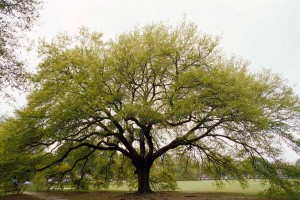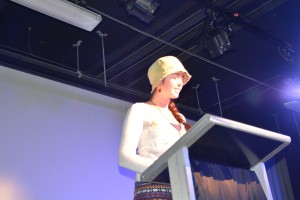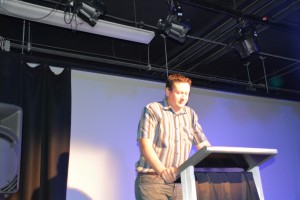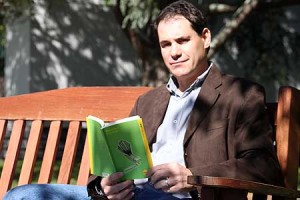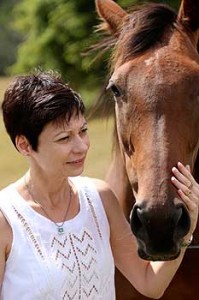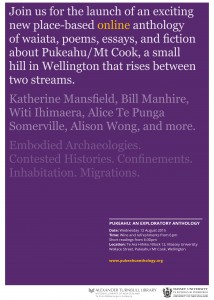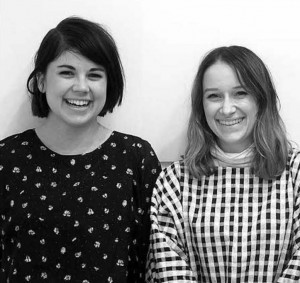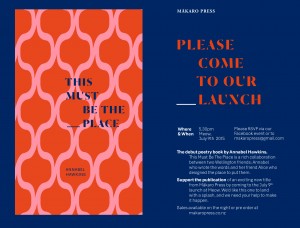Warm congratulations to Megan Stace-Davies, School of English and Media Studies tutor at Manawatu, on winning Massey University’s Arbor Day Writing Competition. Megan’s entry was a story about rescuing a cherry tree that was repeatedly attacked by vandals. It was commended by the judges for its “emotional power” and the “crystal-clear way she expressed this”.
Category Archives: Creative Writing
More Creative Works from Waves
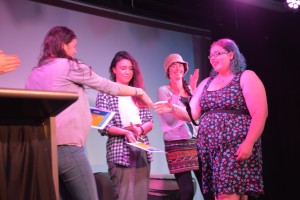
The EAC Climate Change Creative Writing finalists Stevie Greeks, Braidicea Warriner and Sophia Dempsey receive their awards from EAC president Olie Body
Last but not least in our series of posts of creative works from Waves: Climate Change Theatre Action Aotearoa (#climatechangetheatreaction), we bring you all in one place the links to the three finalists’ poems from the Expressive Arts Club Climate Change Creative Writing Competition.
The Expressive Arts Club is a large and vibrant student club at Massey Wellington campus open to students and alumni in our three Expressive Arts disciplines: creative writing, digital media production and theatre studies. (Plus we do find their friends from other majors tend to want to join the fun too, which is fine by us as the more the merrier.) EAC ran meet-ups and showcase events throughout 2015, culminating in the climate change creative writing competition in association with Waves. Many more events are planned for 2016 so if you want to join the best student club on Wellington campus, see http://www.mawsa.org.nz/clubs/clubs-mawsa-2015/massey-wellington-expressive-arts-club/ for details.
Thank you to Dr Ingrid Horrocks, creative writing senior lecturer, for expert judging of the entries in the EAC competition. Here are all three finalists – congratulations to them all, and happy reading!
Links to read online the three shortlisted poems from EAC Climate Change Creative Writing Competition 2015.
1. Finalist: A race to extinction by Stevie Greeks
Melting Clocks: Poem from Waves
In the second installment of our creative work posts from Waves: Climate Change Theatre Action Aotearoa (#climatechangetheatreaction), we bring you ‘Melting Clocks’ by Braidicea Warriner. This poem was Highly Commended in the Expressive Arts Club Climate Change Creative Writing Competition 2015.
Braidicea Warriner recently completed a Bachelor of Arts where she developed a passion for writing screenplays. The weirdest thing she’s ever written is a love poem from a grassy lawn to a willow tree. Some of her favourite-sounding words include; effervescent, epiphany, clandestine and cacophony.
Melting Clocks
By Braidicea Warriner
Salvador Dali’s
melting clocks are
all the more
relevant today
At my house
the tap drips
like a reminder
that this big blue
marble of dreams
is quickly dissolving
into an apocalyptic puddle
Pearls of water
slap the stainless steel
like hurried footsteps
Water weeps from the hour-hand
and time drains down the colander
in the kitchen sink
Drowning tensions
are shipwrecked
in my stomach
as I gaze at
the intricate tree
stump
outside my window
Exposed like an open artery,
it bleeds sap
seeping down its age-defining rings
Branches and twigs
lay scattered
like dismembered
body parts,
a skeleton that was once
filled with the flesh
of crimson flowers
and outspoken birdsong
The tap continues
to drip relentlessly
like a siren in my ear
it strikes the stainless steel
harder and faster
A pool of water trickles
down the edge of the bench
like the world slipping
off its surface
Creative Works from Waves
If you couldn’t make it to Waves, our fantastic #climatechangetheatreaction event recently, or you were there, loved it and would like to relive those magic moments, we’ll be posting some of the creative writing work here for your reading pleasure. So no more fear of missing out!
First up, we’re posting Phil Braithwaite’s moving monologue from The Atom Room. Phil, who teaches on our Expressive Arts programme, has won multiple awards including the top playwriting award in New Zealand, and we were honoured to have him share at Waves this sneak preview from his next major work. Our audience nominated the lines ‘And the rats and stoats’ and ‘I don’t even know who to be angry at any more’ as some of the best lines in the show (along with David Geary’s Al Gore saying ‘I told you so!’)
In The Atom Room, Danny and Sarah are a modern couple. They are living in a long-distance relationship: he is in Wellington, and she is on Mars. But this is a universe where the Earth has been catastrophically damaged by tsunamis and nuclear meltdowns, and the rich elite are moving to outer colonies and Mars.
Sarah is an engineer and scientist in the Mars programme. Danny is on his own on Earth, working for Envirocorp, the only organisation left that looks out for the environment. Every now and then they can meet in The Atom Room: the most advanced virtual avatar programme in the galaxy. In his monologue, Danny is engaged in a series of interviews, trying to talk about the death of his planet, and why he refuses to leave it.
Danny’s monologue from The Atom Room.
Philip Braithwaite
DANNY I once heard this saying: ‘They were joined at the wound.’ That’s how it was with me and Sarah. Not only that, you know, but we discovered pretty early on that we’d both lost everyone in the deluge. We were both orphans.
Problem is, now the world is crawling with orphans, running around, trying to find a home.
When someone’s about to die, and you know they haven’t got long left, you ignore it. You make excuses.
He came home one day. She knew he’d been sick, but mum just thought it was the weather, it was a cold, it was whatever. He brought home some lemons, a bag of lemons. And she said he couldn’t hold onto the bag. He was so weak he couldn’t even carry a bag of lemons.
They’d be out for their daily walk and he’d say, ‘hold on,’ and he’d have to take some time to get himself together. He’d clutch at a pole or a stairwell or anything that was handy. She said that was all she knew about how sick he was; the rest he kept hidden, beneath that iceberg: the giant was cracking and melting.
The Earth was like that: it cracked open, it split itself down the fault lines. It was sick, its sickness was stabbing our faces, tumbling through us, but we had cars and jobs and families, and we didn’t notice. We lost touch. We walked around in the streets. We didn’t see.
I wasn’t there when the deluge came. We called it the deluge, but you know, that’s only the first act. The fault lines, they opened up through the middle. It’s a good thing space exploration was up and running at the time. It’s good the Russians and Americans kept trying to outdo each other. If you had enough money when the tsunamis and storms came you could get out.
You know how everyone thought it was gonna be nuclear war that ended us? It wasn’t like that. It was so much subtler than that, so much slower. It was just that we weren’t paying attention.
Dad was getting radiation therapy for his cancer at the time. Radiation therapy! All he needed to do was stand outside! Open up his arms and let the sky pour itself inside him. The iceberg, it melted, it flowed into the world. The earthquakes, then the tsunamis. The meltdowns. It’s hard to know whether it went willingly or under duress, whether it gave us a passing thought or whether it was happy to jettison us, so that maybe it could start again.
Nothing much could survive those first few months. But somehow the planet spared me. I was standing on train tracks, the train was coming, and it went right past me.
Actually I was in an office building discussing a document on the preservation of native birdlife against the threat of rats and stoats, and then the tsunami came and washed away the buildings. And the rats and stoats, so that was that problem solved.
We were evacuated and taken to a safehouse. One of the many ironies: because I work for the environment we were able to avoid the extremities that it threw at us. Sit it out.
After that, when the world had shaken us free, we couldn’t cling on anymore; the fault lines, they’d all cracked open; we were walking inbetween, hanging on to the cliff face.
Charitable trusts, church groups, they set up shelters, and gave out free counselling, if you didn’t mind the ministers, the church fathers, even the liberal ones, starting to rabbit on about the end-times and being prepared and all that. If you could put up with that then at least you had someone to talk to and a cup of tea: in that sense they certainly were prepared. The earth is cracking open and you’ve still got your choice of Dilmah special filter, Twinings, Bell, or Rooibos for the more adventurous parishioner.
I never saw it, except I did. It’s worse in your mind. I have this dream, where the storm comes over the horizon, the burning light, and it sort of envelops everyone … then … nothing. I wake up. I wish it was as dramatic as that. It wasn’t like that. I sat it out.
When the atmosphere became unbreathable, we all bought oxygen helmets. Oxygen helmet manufacturers. Advertising! Everywhere!
It seemed like there was this shift, this perceptible change in … I don’t know, agendas. Suddenly the planet was dead, but no-one was telling you about it. The advertising, it washed over you, like that giant iceberg, flooding towards you, without shape, you’re numb to it. It rolls towards you, this giant mass of buy this and go here and do this and everything’s fine. And money and corporations and pop culture and oil and lemons and chemicals, and Hollywood stars and hydrogen bombs. Ads and bad poetry, and sometimes you can’t tell the difference.
But it wasn’t about Earth. It was pointing somewhere else. No-one was talking about Earth. The commercials, they were talking about spreading out, us children, leaving home for the first time, into the stars, it was time, time to make the change, time to cut the apron strings, that’s where we were supposed to be, out there, the exterior of life. When life throws you lemons. That’s where you went if you had the money. That’s where you could feel better. You could pay in instalments. Equity, loans, brokers. Suddenly everyone’s flying to the Moon, to the space stations. They all took off, the governments couldn’t stop them. There was no government, even that was gone. You didn’t even know who to be angry at anymore. You walk through the embers now and all you see is where things used to be. We’re defined by the past tense.
So Sarah went to Mars, to build a new Eden up there, start again. Create opportunities for chain stores and Dilmah tea bags. I stayed here and tried to rebuild the old. But I want to be here. And I’m starting to think, maybe that’s the difference between me and her.
I once said to her, ‘We’re joined at the wound.’ She didn’t like it. She thought it was a weak thing to say. She said I feel sorry for myself, and we have to just get on with it. And I suppose I do feel sorry for myself, but I don’t. I feel sorry for us. ‘Cause it showed us who we really are.
National Poetry Week – Palmerston North
Various School of English and Media Studies staff are taking part in a poetry showcase being held in Palmerston North next week. Specifically Thom Conroy and Joy Green are in a team competing in 50 GREAT PHOTOS, 50 SMALL POEMS, pitting their skills against others to write a poem in 10 minutes about a photograph chosen by a member of the public.
In addition, Tim Upperton will be reading at the e- book launch of “Anthology of Poetry Ma…king”, which also features the work of Margi Metcalfe and Joy Green.
Further information on both events can be found at :
http://poetrybeyondwords.org/read-me-bedford/.
Massey poets in running for Montreal prize
Deepest congrats to Bryan Walpert and the newest Massey PhD in Creative Writing, Johanna Emeney. They are the only NZ Poets to make the long list for this international poetry prize!
Pukeahu: An Exploratory Anthology Launch
Join us in Wellington on Wednesday 12 August for the launch of an exiting new online anthology.
A collaboration between staff and students in Massey University’s School of English and Media Studies and the School of Design, produced in partnership with the Alexander Turnbull Library, National Library of New Zealand, Te Puna Mātauranga o Aotearoa.
PUKEAHU: AN EXPLORATORY ANTHOLOGY
Edited by Ingrid Horrocks, Lynn Davidson, Lena Fransham, and Thomas Aitken. Designed by Rosie Percival.
http://pukeahuanthology.org/
The launch will include short readings from 6:30pm by:
Angela Kilford
Lena Fransham
Bill Manhire
Vivienne Plumb
Thomas Aitken
Chris Tse
Lynn Davidson
Date: Wednesday 12 August
Time: Wine and refreshments from 6 pm
Location: Te Ara Hihiko/Block 12, Level C. Massey University, Entrance E off Tasman Street, Pukeahu/Mt Cook, Wellington
Massey Graduate’s First Poetry Collection Reviewed
A great review of Wellington Massey Expressive Arts graduate, Annabel Hawkins’ first collection of poetry, This Must be the Place:
‘The move from a blog, where the posts were an amalgam of structured poems, as well as open-form entries with no real structure, was a challenge. Here, in This Must be the Place, these have been collected, worked on, revised, and her words are bound together with feelings and memories. The form is stricter, but the intentions and honesty remain in the collection. Hawkins avoids high-brow language and form, aiming instead for accessibility. Her language oscillates, as if working to a pattern, between poeticism surrounding time and abstract emotions, and specific language of both time and place—with references to polar fleeces, durries, skateboards, ripped jeans, Briscoes, all carving out an eternal moment in time.’
If you’d like to read more, click http://bit.ly/1Lm1nCx.
Debut Poetry Book Launch
Competition Winner – Janet Newman
Master of Creative Writing student, Janet Newman, has won first place in the Page & Blackmore Short Story Competition, run by the Top of the South branch of the New Zealand Society of Authors. Judge Ted Dawe, commended Janet’s short story “Like Light” for its seamless transition of narration and quality of writing. Congratulations, Janet!
